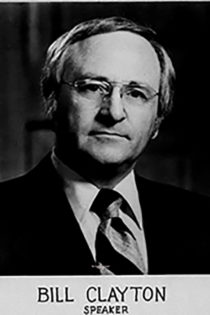Texas Pundits Ponder the Importance of the BriLab Scandal 40 Years On
By Shepard Price
Reporting Texas

Image Courtesy Legislative Reference Library of Texas
Few Texas politicians have amassed the kind of power and influence that Billy Wayne Clayton enjoyed. Speaker of the Texas House of Representatives from 1975 to 1983, the Lamb County Democrat revolutionized the reach of the office. He put in place the state’s first sunset law, which created a commission to eliminate outmoded state agencies, updated House operations for efficiency, and was the first speaker to direct standing committees to work on legislative issues between sessions. All such moves strengthened Clayton’s hold on his office.
“Clayton was … an old-style Texas legislator,” said Wayne Slater, a veteran political writer and former Texas political reporter for Dallas Morning News. “Back-slapping, friendly, knowledgeable, (a) good old boy type.”
Clayton was born in Young County in 1928 and earned a bachelor’s degree from Texas A&M in agricultural economics in 1950. After graduation he returned to the family farm and spent 12 years in the Texas House before being elected speaker.
In 1979, Clayton’s career headed south with a vengrance. FBI investigators mounted a sting operation in which he accepted $5,000 purportedly to rig a lucrative government insurance contract. It was part of a high-profile nationwide scandal called BriLab, short for bribery and labor, which also brought insurance scam convictions against Charles Roemer, aide to Louisiana governor Edward Edwards, and powerful New Orleans mob boss Carlos Marcello.
Forty years after the sting stung Clayton, public memory of the event has dimmed, but political observers in Austin say it’s worth remembering. BriLab marked a pivot point in Texas politics, ushering in reforms aimed at replacing the state’s wild and woolly past with a more transparent system featuring stringent financial reporting requirements for public officials and campaign campaigns. Those measures, Slater said, “moved us to a place where we can now see the flow of money that used to be done in secret.”
BriLab made for high drama, to be sure. On Oct. 19, 1979, Joseph Hauser, a convicted conman and FBI plant posing as a representative for Prudential Insurance Co., called on Clayton at the State Capitol with L.G. Moore, a union official claiming to represent state employees. The two men promised Clayton a $600,000 bribe if he would help rig a $76 million insurance contract, a move the men claimed would save Texas $1 million in insurance costs. To seal the deal, the FBI surrogates handed Clayton an envelope containing $5,000 in cash. Clayton stashed the money in his office credenza.
On June 12, 1980, federal prosecutors indicted Clayton on charges of fraud, conspiracy, extortion and racketeering. The news set Austin, and Texas, ablaze.
“You can imagine, all that dropping on a Friday night, the full-fledged indictment alleging all these details, it was like a bomb in the capitol,” said Saralee Tiede, a retired journalist then working for the Dallas Times Herald.
The U.S. District Court for Southern Texas dismissed all charges against Clayton in October 1980, mainly because he had never spent the $5,000. But the furor surrounding the trial eventually forced him to give up the speakership in 1983 and dashed further hopes for holding statewide office.
“He had gone to the trouble of having stationery drawn up for the race for agriculture commissioner,” said Dave McNeely, a political reporter for the Austin American-Statesman at the time, “but some of his workers had taken polls and it came out that his perception was poisonous among Texas voters.”
In later years, the well-connected Clayton became a lobbyist and a powerful one, switching his party registration to Republican in 1985. He pressed for stricter campaign finance disclosure laws as part of Campaigns for People, a political advocacy group.
Clayton’s enduring legacy, McNeely said, is to have pulled the speaker’s office into the center of political power. “Clayton was the first Texas House speaker to serve more than two consecutive terms—he served four,” McNeely said. “[P]eople began to realize the office had grown in power, and it was right behind governor and lieutenant governor as the most powerful office in the state.”
The reforms BriLab helped put in place were clearly overdue. “In the 70’s, the fed began to pass more reporting of and limitation on contributions to people running for office,” McNeely said. “[Y]ou needed more and more reporting of who gave how much, and limitations were placed on how much you could give, the purpose of which was to stop power from being accumulated by the financially powerful.”
Yet in the view of some observers, the state government’s post-BriLab crackdown on “secret corruption,” as Slater calls it, created its own sets of negative consequences by sluicing the flow of money into campaign coffers in questionable ways.
“A special interest gives money and legislation is passed that benefits that special interest,” Slater said. “As long as it is disclosed, and the two people don’t discuss it, all you have is a campaign contribution.”
So, while Texas politics may be less colorful than in the pre-BriLab days when lobbyists could walk into a legislator’s office and fork over an envelope of cash in return for political favors, the era of inflated spending still allows legislators the chance to trade campaign contributions for targeted legislation.
Clayton was appointed to the Texas A&M board of regents by Gov. Bill Clements in 1989. In 1990, he earned a Master’s Degree in Business Administration from University of Texas at Austin. Clayton died in Lubbock in 2007.